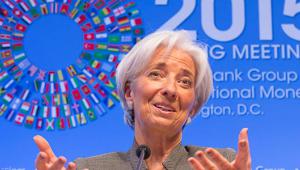By Judith Ugwumadu | 9 April 2014
World economies need to overcome remaining fiscal challenges before they can ‘declare victory’ on the Great Financial Crisis, the International Monetary Fund’s financial counsellor and director has said.
Speaking at the Global Financial Stability Report conference today, José Viñals said that strong policy actions were needed to turn the corner and engineer a successful shift from ‘liquidity-driven’ to ‘growth-driven’ markets.
Viñals warned that, in order to reach global stability, both advanced and emerging economies would face new challenges even as the legacy of the financial crisis recedes.
One major challenge was the US tapering its quantitative easing policy, which, if not handled smoothly, could trigger financial stability risks around the world such as higher-than expected inflation, interest rate rises and widening credit spreads.
Emerging markets, he cautioned, were especially vulnerable to a tightening in the external financial environment, after a prolonged period of capital inflows, easy access to international markets and low interest rates.
‘This has induced substantial amounts of borrowing, particularly by emerging market companies. But rising interest rates, weakening earnings and depreciating exchange rates could put substantial pressure on emerging market corporate balance sheets under our adverse scenario,’ Viñals said.
He also said that if China was to achieve an orderly deleveraging of its shadow banking system, policymakers would need to manage the transition to a financial sector in which market discipline plays a larger role and prices more accurately reflect risks, without triggering systemic stress.
In the eurozone, he added that the incomplete repair of bank and corporate balance sheets continues to place a drag on the recovery. Further efforts must be made to strengthen bank balance sheets, through the European comprehensive bank assessment and follow-up, and to tackle the corporate debt overhang, he proposed.
Viñals continued: ‘Failure to adequately address any of the challenges that I mentioned could have a substantial impact on global stability. The sizable inflows into emerging markets over the past number of year could reverse.
‘Assets price moves may be amplified by the lower market liquidity conditions, with more investors running for the exit than the exit door can accommodate.
‘This rush for the exit could extend to some segments of developed markets straining market liquidity and amplifying market volatility.’
The priority for advanced economies in particular was to get the normalisation of US monetary policy right, he said, adding that timing, execution and communication was paramount.
To achieve this, effective macro-prudential policy is key to allow for smooth exit by containing financial stability risks.
For emerging markets, Viñals said these economies needed to continue to prepare for tightening in global financial conditions by enhancing resilience through strong macro and prudential and by building policy buffers.
He added that: ‘Beyond national actions, we need greater global policy cooperation as we are all in this together. This extends to monetary policy, financial regulation and supervision, and ensuring orderly market conditions.’
Yesterday, the IMF cut its outlook for the world economy in 2014 to 3.6% from 3.7%.













